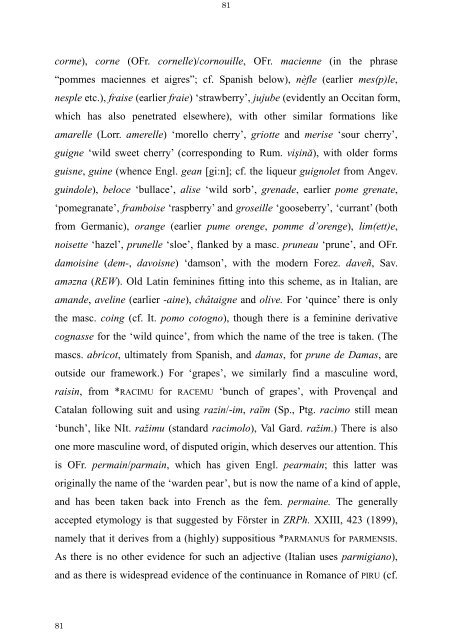The Latin Neuter Plurals in Romance - Page ON
The Latin Neuter Plurals in Romance - Page ON
The Latin Neuter Plurals in Romance - Page ON
You also want an ePaper? Increase the reach of your titles
YUMPU automatically turns print PDFs into web optimized ePapers that Google loves.
81<br />
81<br />
corme), corne (OFr. cornelle)/cornouille, OFr. macienne (<strong>in</strong> the phrase<br />
“pommes maciennes et aigres”; cf. Spanish below), nèfle (earlier mes(p)le,<br />
nesple etc.), fraise (earlier fraie) ‘strawberry’, jujube (evidently an Occitan form,<br />
which has also penetrated elsewhere), with other similar formations like<br />
amarelle (Lorr. amerelle) ‘morello cherry’, griotte and merise ‘sour cherry’,<br />
guigne ‘wild sweet cherry’ (correspond<strong>in</strong>g to Rum. viş<strong>in</strong>ă), with older forms<br />
guisne, gu<strong>in</strong>e (whence Engl. gean [gi:n]; cf. the liqueur guignolet from Angev.<br />
gu<strong>in</strong>dole), beloce ‘bullace’, alise ‘wild sorb’, grenade, earlier pome grenate,<br />
‘pomegranate’, framboise ‘raspberry’ and groseille ‘gooseberry’, ‘currant’ (both<br />
from Germanic), orange (earlier pume orenge, pomme d’orenge), lim(ett)e,<br />
noisette ‘hazel’, prunelle ‘sloe’, flanked by a masc. pruneau ‘prune’, and OFr.<br />
damois<strong>in</strong>e (dem-, davoisne) ‘damson’, with the modern Forez. daveñ, Sav.<br />
aməzna (REW). Old <strong>Lat<strong>in</strong></strong> fem<strong>in</strong><strong>in</strong>es fitt<strong>in</strong>g <strong>in</strong>to this scheme, as <strong>in</strong> Italian, are<br />
amande, avel<strong>in</strong>e (earlier -a<strong>in</strong>e), châtaigne and olive. For ‘qu<strong>in</strong>ce’ there is only<br />
the masc. co<strong>in</strong>g (cf. It. pomo cotogno), though there is a fem<strong>in</strong><strong>in</strong>e derivative<br />
cognasse for the ‘wild qu<strong>in</strong>ce’, from which the name of the tree is taken. (<strong>The</strong><br />
mascs. abricot, ultimately from Spanish, and damas, for prune de Damas, are<br />
outside our framework.) For ‘grapes’, we similarly f<strong>in</strong>d a mascul<strong>in</strong>e word,<br />
rais<strong>in</strong>, from *RACIMU for RACEMU ‘bunch of grapes’, with Provençal and<br />
Catalan follow<strong>in</strong>g suit and us<strong>in</strong>g raz<strong>in</strong>/-im, raïm (Sp., Ptg. racimo still mean<br />
‘bunch’, like NIt. ražimu (standard racimolo), Val Gard. ražim.) <strong>The</strong>re is also<br />
one more mascul<strong>in</strong>e word, of disputed orig<strong>in</strong>, which deserves our attention. This<br />
is OFr. perma<strong>in</strong>/parma<strong>in</strong>, which has given Engl. pearma<strong>in</strong>; this latter was<br />
orig<strong>in</strong>ally the name of the ‘warden pear’, but is now the name of a k<strong>in</strong>d of apple,<br />
and has been taken back <strong>in</strong>to French as the fem. perma<strong>in</strong>e. <strong>The</strong> generally<br />
accepted etymology is that suggested by Förster <strong>in</strong> ZRPh. XXIII, 423 (1899),<br />
namely that it derives from a (highly) suppositious *PARMANUS for PARMENSIS.<br />
As there is no other evidence for such an adjective (Italian uses parmigiano),<br />
and as there is widespread evidence of the cont<strong>in</strong>uance <strong>in</strong> <strong>Romance</strong> of PIRU (cf.









